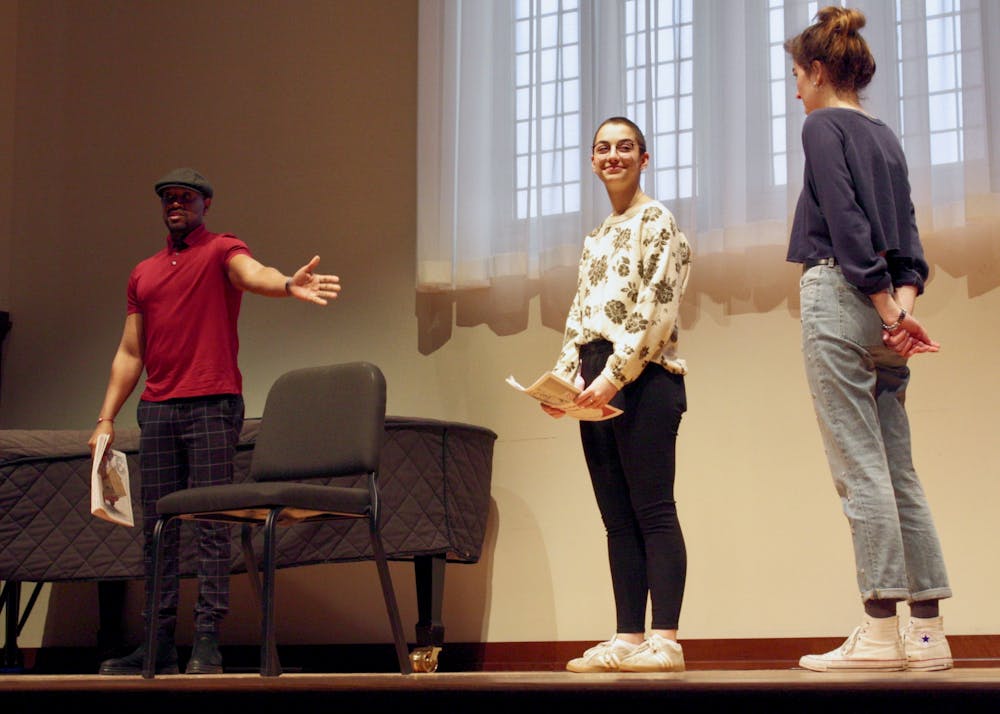Bryan Terrell Clark, best known for his role as George Washington in the Broadway hit “Hamilton,” visited the University of Richmond campus on Thursday as part of the Center for Student Involvement’s programming for Black History Month.
Over the course of the day he delivered a message of purpose, self-care and self-worth at three events: a morning master class with music, theater and dance students, a lunchtime Q&A with faculty members and staff members and an evening lecture open to the public.
Alison Keller, director of the Center for Student Involvement, said the Center for Student Involvement had chosen Clark to speak because of his message.
“You use the ‘Hamilton’ piece, but then his vision and his passion is to [help students find their] voice in the middle of stereotypes,” she said.
During the first half of the master class, which was held in Perkinson Recital Hall, students got up and moved onstage as Clark emphasized the importance of "listening kinesthetically."
“I’m asking you to listen with your bodies,” he said. “The work that we do as performers – it’s with our bodies. You are the instrument.”
The second part of the master class was a Q&A, during which students asked Clark about his experience in the theater industry. Senior Leslie Gaines asked how he balanced the business of theater with his passion for the art.
Clark responded that making self-care a priority was important.
“You cannot show up and be present and give when you have not first taken care of yourself,” he said.
Clark also advised students not to conform to outside standards. “As an artist … you have to be unapologetic in your pursuit of your most authentic self,” he said.
Senior Shanna Gerlach, a theater major, said Clark’s message resonated with her.
“I feel nervous,” Gerlach said. “I’m graduating. … And I feel like that makes it even more important to hear the stuff that he’s saying.”
Enjoy what you're reading?
Signup for our newsletter
At the evening lecture in Camp Concert Hall, Clark continued the self-care theme, challenging listeners to put themselves first.
“When I’m on planes, they always say, ‘In case of emergency, if an oxygen mask drops down, put it on your face first,’” he said. “If you’re trying to help the person next to you [and you don’t put on the mask] … you’ll pass out before you can help.”
Clark also talked about his initiative, inDEFINED, which works to equip people with “the freedom to define themselves," according to its website. He asked the members of the audience to write down hurtful words they had been called and cross them out.
“You’re not limited to any of these things,” he said. “In fact, you are whatever you say you are. … If you’re still here, I don’t care what you’ve gone through. You’re worthy of being here.”
Emily Marie Breaux, a junior, said she had found that part of the evening affirming. “[Clark] really cares about people,” she said. “He really engages with them.”
Clark also shared stories about his personal life and the struggles he overcame growing up. He cited his father as one of the reasons he could audition for roles again and again without getting discouraged.
“If my dad could go to rehab 22 times, I can definitely fight these battles,” he said.
Kobie Turner, a junior, called Clark a powerful and authentic speaker. “He actually got real with us, sharing his personal life," he said. "I felt like I was really able to connect with a lot of what he said.”
The response from people who attended the lecture and master class was overwhelmingly positive, although multiple students said they had not known what to expect beforehand.
Gerlach said she had had no idea what shape the master class would take. Turner said he had thought the lecture would focus on music and arts.
Breaux agreed. “I thought I was going to come to hear about industry tips and tricks,” she said.
“I was not expecting this, but I’m so happy I came.”
Breaux heard about the event from her voice teacher, Jennifer Cable, and emails from student organizations, such as University Players, she said.
The CSI also promoted Clark’s visit via posters, social media and the UR Involved app, Keller said.
Breaux, however, said she didn’t think there had been enough advertising.
“I wish more people would have come,” she said. “I think a lot of people needed to hear something like this.”
Keller said that the planning for Clark’s visit had started last April, but that his message felt especially relevant after recent incidents on campus.
“Who knew that all of this would come together at this point in time?” she said. “But how appropriate.”
Betty Crutcher, cross-cultural mentoring consultant and wife of UR President Ronald A. Crutcher, who attended the evening lecture, told Clark that he was “a model of faith, hope and healing.”
“I wish that this room was a room full of students who could have heard this message,” she said. “We need your voice.”
Contact copy editor Caroline Fernandez at caroline.fernandez@richmond.edu.
Support independent student media
You can make a tax-deductible donation by clicking the button below, which takes you to our secure PayPal account. The page is set up to receive contributions in whatever amount you designate. We look forward to using the money we raise to further our mission of providing honest and accurate information to students, faculty, staff, alumni and others in the general public.
Donate Now



